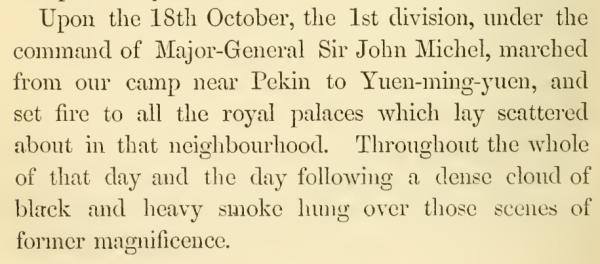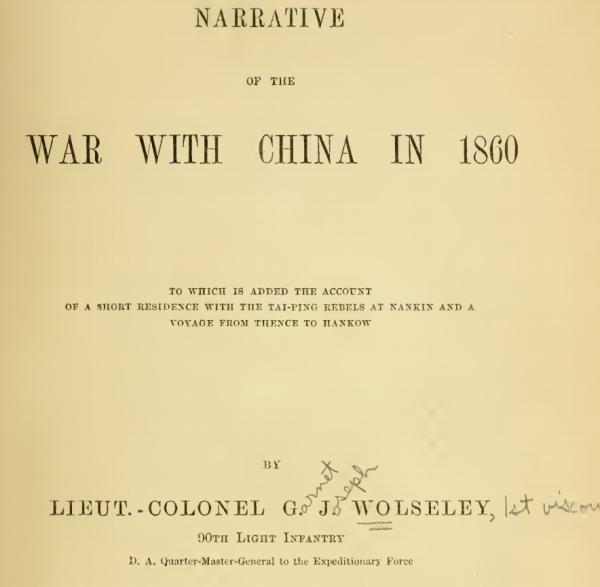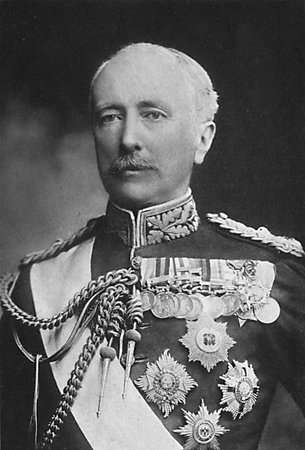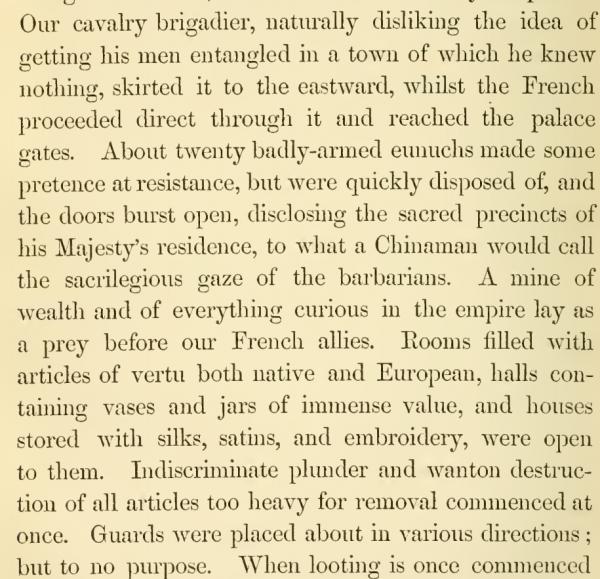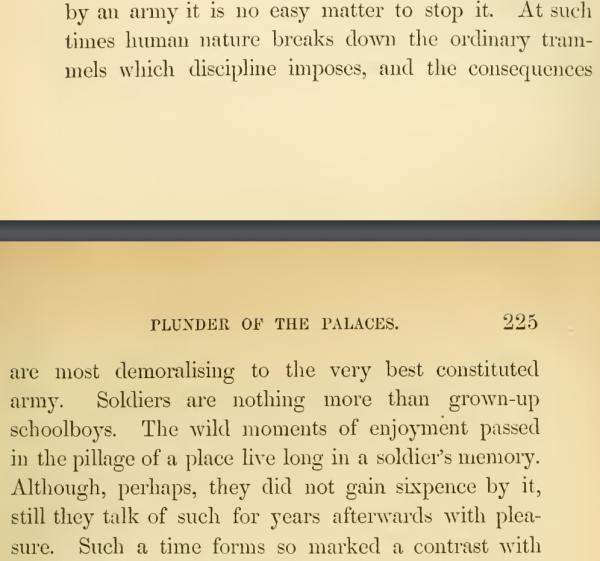| 法军没有参与焚烧皇帝园子3500英军干的 |
| 送交者: Pascal 2019年04月17日23:41:24 于 [五 味 斋] 发送悄悄话 |
|
1860·9·18 —— A Date Which Will Live in Infamy of His Majesty Hien-Fung
Upon the 18th October, the 1st division, under the command of Major-General Sir John Michel, marched from our camp near Pekin to Yuen-ming-yuen, and set fire to all the royal palaces which lay scattered about in that neighbourhood. Throughout the whole of that day and the day following a dense cloud of black and heavy smoke hung over those scenes of former magnificence. 升级版谷歌同学一秒钟完工译文: 1860年10月18日,英军约翰·米歇尔少将下辖第一师 从我们所在北京附近的营地开拔到圆明园, 放火烧毁所有散落的皇家宫殿。 整个过程 那天和密集的云层之后的那一天 黑色和浓烟笼罩着那些场景 昔日的辉煌。 —— Excerpts from Narrative of the War with China in 1860 Page 278
作者:1860年中英第二次战争中 英军陆军司令詹姆斯·霍普·格兰特 James Hope Grant 参谋部 后勤主管 deputy-assistant quartermaster-general 时年27岁中校 Lieutenant colonel 第一代子爵 嘉内德·约瑟夫·沃尔斯利 Garnet Joseph Wolseley, 1st Viscount Wolseley;1894年5月26日, 晋升为陆军元帅 Field Marshal https://ia800208.us.archive.org/10/items/narrativeofwarwi00wols/narrativeofwarwi00wols.pdf Early in the morning of October 18, a division of British troops marched off to Yuanmingyuan. The accounts left by the people present on that fateful day all mention the immense beauty of the gardens even in its post-looted state. “We marched through scenery of the most enchanting beauty,” wrote reverend M’Ghee, and as he explained, the beauty demanded some kind of tribute, “a tribute so due that you must perforce pay it.” 99 Other eyewitnesses must have felt the same. Beauty, they too argued, cannot simply perish without us, its beholders, taking some kind of action; 98 . According to Allgood there were 3,500 men involved. Allgood, China War 1860 , 58. —— Excerpts from Liberal Barbarism: The European Destruction of the Palace of the Emperor of China By Ringmar, Erik https://portal.research.lu.se/ws/files/5852516/4612601.pdf In the end only 18 out of the 39 men came back alive. This treatment, the Allies agreed, constituted a crime against the laws of war, against humanity, and an insult both against Britain and France. The Chinese had to be punished, the question was only how. The commanders considered a number of alternatives. 87 They could, for example, have asked the Chinese to pay an indemnity or demanded that they turn over the men responsible for the treatment of the prisoners. However, Elgin did not think it right to accept money in return for human lives and besides, he argued, the sums would have been difficult to collect. And if they had asked the Chinese to hand over the perpetrators, the imperial authorities would surely have given them some miserable underling who the Allies would have found it difficult to punish, and if they had asked for Sengge Rinchen himself, the Chinese would have refused and the Allies would have had no means of forcing them. Having ruled out the alternatives, Lord Elgin argued, only the destruction of Yuanmingyuan remained. It was an “act of retribution and punishment sufficiently severe to produce the required effect” —it would avenge the lives that had been lost, but it would also terrorize the Chinese, forcing them to agree to European terms and reminding them for ever more just who the Europeans were and of what they were capable. The effect, moreover, would be instantaneous, making it possible for the Allies to turn southward before the weather had turned too cold. Although other targets could be imagined, Yuanmingyuan was particularly well suited to achieve these effects. This was first of all the case since the compound was where the Europeans believed the 39 prisoners had been held captive. Through a complete incineration, the site of their humiliation would be obliterated. Destroying the palace was also a way to strike at the Chinese emperor personally rather than at the Chinese people with whom, Elgin insisted, Britain had no quarrel. Yuanmingyuan “was the Emperor’s favourite residence, and its destruction would not fail to be a blow to his pride as well as to his feelings.” The action would no doubt “produce a greater effect in China and on the Emperor, than persons who look on from a distance may suppose.” 法军两位指挥官反对额尔金勋爵烧毁圆明园以报复残害21名联军致死的提议 The French, however, were not convinced by these arguments. Baron Gros objected in the strongest possible terms against the action Elgin contemplated and he categorically refused to lend French support to a complete incineration. “It takes a courageous resignation not to let oneself be swept away by the desire for vengeance which has taken hold of all hearts.” 94 Yet Gros left it open to General Montauban, as the military commander, to make the final decision. Happily, Montauban reached the same conclusion as Gros, and this despite strong pressure exerted on him by the British commanders. I too have considered the question very carefully, Montauban insisted in his reply to Elgin, and I have come to the conclusion that “this vengeance is worthy of a people more barbarian than the Chinese themselves.” Moreover, if we burn the palaces and gardens Prince Gong might take flight and thereby we might end up overthrowing the entire Qing dynasty. Such an outcome would not be in the best interests of the French government. We want a China open to trade and to Christian missionaries, but we do not want a China in chaos. Yet none of these arguments had a effect on Lord Elgin. The British made fun of the 11th hour piety of the French, pointing out that they only would complete the work that the French themselves had begun. 没有参与焚烧皇帝园子的法军, 却是1860年10月7日清晨先于英军第一批进入圆明园抢掠洗劫的:
上述这一区别,法国作家维克多·雨果都注意到了, 难怪他在1861年11月25日信中说: This wonder, Hugo explained, has now disappeared. One day two bandits entered, “ one plundered, the other burned. ” 有一天,两个来自欧洲的强盗闯进了圆明园。 一个强盗洗劫财物,另一个强盗在放火。 |
|
|
|
|
 |
 |
| 实用资讯 | |
|
|
|
|
| 一周点击热帖 | 更多>> |
|
|
|
| 一周回复热帖 |
|
|
|
|
| 历史上的今天:回复热帖 |
| 2018: | 关于中兴最好的评&# | |
| 2018: | 胡锡进不地道,自己用爱疯还说挺华为中 | |
| 2017: | 性和爱,哪个对于婚姻更重要? | |
| 2017: | 中国和朝鲜--基本类似的国家 | |
| 2016: | 雪山下的绛珠草:日本为什么侵略中国 | |
| 2016: | 冬冬,今天买了两pack野生三文鱼,十分 | |
| 2015: | 巫叟妹,你无端攻击阿拉新教不好。胡鲁 | |
| 2015: | 很庆幸,我们成功地把宗教挡在公立学校 | |
| 2014: | 中餐和西餐哪个好? | |
| 2014: | 经历的中美麻雀的区别 | |




